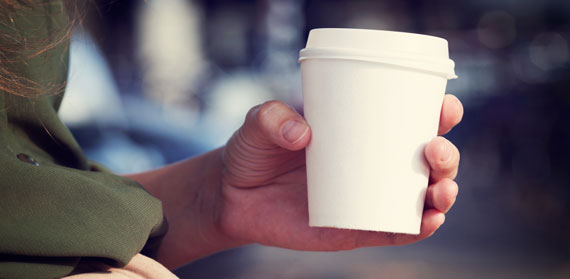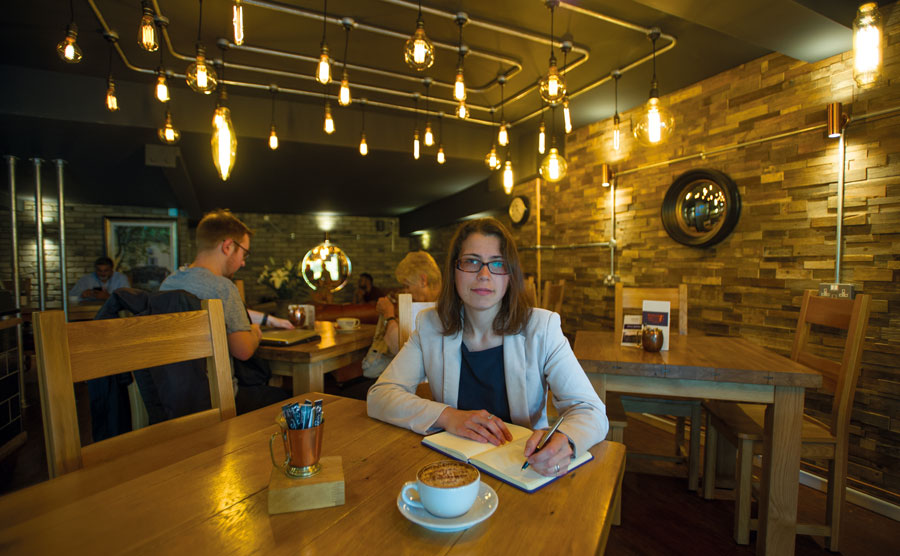Shutterstock
While the rapid growth of the coffee shop industry in the UK has been important for the retail economy it has had significant environmental consequences, most notably the huge amount of disposable coffee cups. It is estimated that 2.5 billion coffee cups are thrown away each day (around 5,000 every minute), with only a very small proportion being recycled, due to lack of facilities to do so. Current estimates suggest this could grow to 3.7 billion by 2025 if measures are not introduced to tackle the issue. The Environmental Audit Committee launched an inquiry into disposable packaging (both plastic water bottles and coffee cups), to try and gauge what can be done about the issue.
In January 2018 it published its coffee cup report arguing there needs to be action along the Environmental Waste Hierarchy – to Reduce, Reuse and Recycle. It recommend government introduce a 25p tax on disposable coffee cups, with a suggested target that all disposable coffee cups should be recycled by 2023; and a total ban by this date if efforts to recycle the cups are not drastically improved.
“There is no excuse for the ongoing reluctance from Government and industry to address coffee cup waste. Disposable coffee cups are an avoidable waste problem and if the UK cannot be confident of their future sustainability, the Government should ban them.” House of Commons (2018: 19)
It has been suggested that the money from this tax could be used to help local councils fund more recycling facilities, or a more extensive ‘binfrastructure’ as it was termed in the report, as well as a clear public awareness campaign on recycling food package waste more generally.
“A “latte levy” on disposable coffee cups would remove some of the financial burden from local authorities and council taxpayers.” House of Commons (2018: 23)
Pret A Manger, one of the largest high street retailers of takeaway coffee recently introduced a 50p discount for consumers who bring a reusable coffee cups, with a very positive response on social media. When asked consumers are likely to say a reduction in price will encourage them to change their behaviour, rather than an increase, but only time will tell if it actually makes a difference.
More generally it is suggested that not enough is being done by industry to recycle coffee cups, and there was confusion from consumers about what was happening to their coffee cup waste, an issue that was highlighted in Hugh Fearnley-Whittingstall’s War on Waste TV programme back in 2016. While technically recyclable, a polyethylene layer in the coffee cup makes them difficult to be recycled, and very few facilities in the UK are equipped to do so. There have however been several voluntary schemes since to try and increase the number of cups being recycled; Costa Coffee launched a nationwide programme to recycle coffee cups, and The Square Mile Challenge in London saw efforts to recycle coffee cups in the very centre of the city. Although as the report suggested, efforts across the industry are inconsistent, and not widespread enough.
The report highlights that not enough has been done to incentivise consumers to make use of reusable coffee cup options. It notes that while many coffee shops offer discounts to bring their own reusable cup, only around 1-2% do so. It is hoped that a tax on disposable coffee cups would lead to the level of reduction that was seen after the 5p charge on carrier bags was introduced in 2015 (83% reduction in use in the first year). To make the way coffee cups are treated clearer to consumers, the report also suggests there needs to be clearer labelling on coffee cups as to whether a cup can be recycled or not, and if it has to be recycled in store or not.
Dr. Jennifer Ferreira from the Centre for Business in Society has been investigating sustainability in the coffee shop industry, including the issue of disposable coffee cups, and responded to the inquiry (her submission can be read here). Her research highlights the points that consumer confusion is widespread over how to recycle their coffee cup, often placing their cup in a recycling bin on the street and assuming this was going to be recycled. She also reiterates the point that while many consumers are turning to reusable cup options, it is only a small proportion as many people find them inconvenient because they need to be carried around in between, and washed after use. In a recent press release from Coventry University she highlighted that while a tax on disposable coffee cups may instigate change, it might not be as quick in making a difference as the 5p plastic bag charge was, because some consumers don’t like to carry around a dirty cup, they feel they take up too much space, they are confused over how much they will be charged for their use, or whether coffee shops will use the cup if it’s not clean enough. Furthermore she argues the issue goes beyond coffee shops:
‘The change in behaviour needed has to go beyond when people grab their coffee on the go in town. A lot of disposable cups are thrown away from offices, and events where tea and coffee are served at meetings and conferences. If people are in the habit of drinking tea and coffee out of the home, then they should be encouraged to carry a reusable cup more regularly’. (Dr Jennifer Ferreira, Coventry University, 2017)
She also highlights that it is important to remember that reusable coffee cups are just one of the wider environmental issues facing the coffee shop industry, alongside more general reduction in packaging and waste, as well as energy use reduction. A new research project led by Dr Jennifer Ferreira explores the issue of fostering sustainable business in the coffee shop industry, focusing on these wider issues, as well as coffee cups, investigating more international examples too.





Comments are disabled